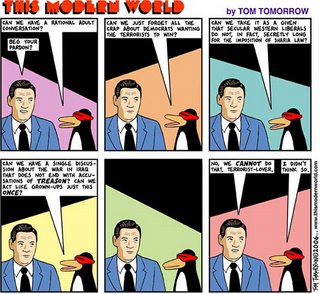Dub can run, but he can't hide. His hubris is killing thousands of people in Iraq (combatants and civilians). Dub is gambling that Iraq is going to become a democracy. He prattles about liberty and freedom without a clue as to what or how those words have any meaning in a tribal country that is riven with ethnic/religious hatreds. If this is a (fair & balanced) national tragedy, so be it.
[x AJC]
"Staying the course" to tragedy: President's failure in Iraq is a consequence of arrogance
By Jay Bookman
The word most often volunteered by Americans to describe President Bush is "incompetent," according to a new poll by the Pew Research Center.
Now, if you're looking for someone to disagree with that assessment, you're looking in the wrong place. But the more interesting question is not whether this administration has been incompetent — that's pretty much settled — but why.
Some Americans attribute the problem to intelligence, and they don't mean the kind of intelligence that the CIA produces. In the Pew poll, the third most commonly volunteered description of Bush is "idiot." On that, I disagree.
Jokes and snark aside, the president is far from a stupid man. Nor are Vice President Dick Cheney and Defense Secretary Donald Rumsfeld, two men whom historians will finger as the prime movers behind the decision to invade Iraq, and the prime culprits in its incompetent execution.
So why have smart, experienced people done such stupid things? There are many reasons, but the most important may be a tragic mismatch between the type of struggle in which we find ourselves and the type of leadership exerted by the Bush administration.
In uncertain times, people gravitate toward leaders who exude certainty and conviction, traits that the Bush administration works hard to demonstrate. Never was that display more vivid than in the president's memorable appearance on the flight deck of the USS Abraham Lincoln, with the "Mission Accomplished" banner stretched behind him.
As we've learned since then, though, we face an enemy in Iraq and elsewhere that is difficult to find and hard to kill. It is constantly adapting, constantly shifting targets, locations, identities and tactics. We possess the most powerful military in the history of the world, but against an enemy of this sort its usefulness is limited.
Instead, defeating such an enemy requires flexibility and agility, an eagerness to learn and a willingness to adapt as quickly if not more quickly than those who oppose us. It requires leadership willing to look at the situation with eyes unclouded by ideology, ready to admit mistakes quickly and try something else.
An administration that refuses to learn, that already knows the answer and sees virtue in its refusal to adjust course, cannot win that kind of war.
And unfortunately, examples of such stubbornness are all too easy to recount. For weeks after the fall of Baghdad, U.S. troops stood by without orders while looters stripped the country. "Freedom is untidy," Rumsfeld said in dismissing the problem, and by the time we realized that "untidiness" represented a serious threat, Iraq had lost of much of its infrastructure and a lot of its faith in America.
For many long months thereafter, officials in Washington also refused to acknowledge to the American public or even to themselves that a home-grown guerrilla insurgency was taking root. By the time that realization was allowed to penetrate the bubble in Washington, the insurgency was too well established to uproot.
In a memo leaked back in October 2003, Rumsfeld bewailed the Pentagon's inability to respond to an enemy that could adapt so quickly and so cheaply. "The cost-benefit ratio is against us!" Rumsfeld wrote. "Our cost is billions against the terrorists' costs of millions."
A recent Associated Press analysis provides a stark illustration of the problem. Since 2004, the U.S. military has budgeted $6.1 billion — about what the Manhattan Project in World War II cost, after accounting for inflation — simply trying to figure out how to defend against improvised explosive devices in Iraq. And every time we make progress, the enemy has quickly improvised a cheap way to thwart us.
And now, of course, we find ourselves confronted by an insurgency mutating into a bitter civil war, a change for which no good response may be possible. That struggle is being fought at such a personal level among Iraqis that U.S. troops have no way to intervene or even know what's going on. Busloads of dead Iraqis seem to show up almost daily now in downtown Baghdad, with no sign of where they came from or who killed them.
If that continues and expands, it's hard to see a further role for U.S. troops. Iraq's fate will then be determined by a nasty, violent struggle among local militias that would take years to resolve itself.
After three years of struggle, that is a terrible, heartbreaking prospect. But some mistakes you just can't fix.
Jay Bookman is the deputy editorial page editor of The Atlanta Journal-Constitution.
Copyright © 2006 The Atlanta Journal-Constitution
Get an RSS (Really Simple Syndication) Reader at no cost from Google at Google Reader. Another free Reader is available at RSS Reader.
